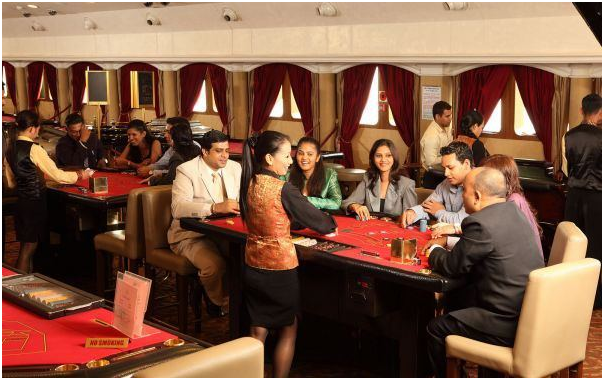Casinos and betting centers placed in the highest tax slabs by the government in India

As eating out is now an expensive affair in India so is betting and going to the movies. With service tax and value added tax (10%- 20% depending on state to state) to be paid at eating out at restaurants now the government adds luxury casinos and betting services in 28% tax slab.
In a recent move the constitutional body tasked with overseeing the goods and services tax (GST) system announced four new tax slabs—5, 12, 18 and 28 percent—for a host of services under the new indirect tax regime that will be rolled out from July 1 2017.
Gambling and race club betting have been grouped in the same tax bracket with other “luxury” services such as cinemas and five-star hotels, and as such, will attract a 28 percent tax. Entry fees in casinos or other entertainment events will also be charged the highest GST rate, but there is no proposal yet to impose additional tax on gambling and betting activities.
According to Union Finance Minister Arun Jaitley, who chairs the GST Council, it’s only fair that cinema halls, casinos and betting centers are placed in the highest tax slab because entertainment and luxury taxes are already merged with service tax in GST.
In the existing tax regime, the cinema exhibition sector was exempted from service tax and state VAT (value added tax), and entertainment tax was the only tax imposed on cinema tickets by states and local bodies. But this brings a set back to film industry.
Similarly casinos in Goa currently pay 15 percent gaming tax on their revenues, while casinos in Sikkim pay 10 percent gaming tax.
Online skill games, which do not fall under gambling, will likely fall under the “all other services not specified elsewhere” category and will be subjected to an 18% GST. This rate is lower than gambling activities, but still slightly higher than the 15 percent service tax currently paid by online rummy, poker and fantasy sports operators in the country.
The GST Council has yet to announce the tax rate for lottery tickets or services provided by lottery distributors, although there have been reports that the government is considering putting the US$7.78-billion lottery business under the 28 percent tax bracket.
At the same time, race club operators in the country have decried the council’s decision to put racing in the highest tax bracket. According to news sources, Vivek Jain, chairman of the Royal Western India Turf Club (RWITC) described the 28% GST as a “killer tax” that may “drive most of the betting into illegal channels, something that will benefit neither the race clubs, nor the government.
Notably, in October 2016, the All India Gaming Federation (AIGF) approached the GST Council asking for formulation of special rules for valuation in certain transactions that occur in this industry along with asking for a lower tax rate for casino transactions. The council also worked towards getting an increase in the TDS deduction from the current slab of transactions above Rs.10,000 to Rs. 20,000. TDS on horse race betting, which was earlier deducted on transactions above Rs.5,000, have been increased to Rs. 10,000 but there were no changes made on skill games like poker, rummy and fantasy sports front.
Industry experts believe that the gambling business may not be adversely affected by the announcement as the 28% tax may prime facie seem higher than the current rate but with the availability of input credit on the goods and services (which is currently not available on the entertainment taxes paid by casinos) the incremental tax burden should be somewhat subsidized. The announcement of a unified taxation system for the gaming industry along with the abolition of the Rs. 1,000-entry tax will only be beneficial in the long term.
All things said and done even the hardcore supporters of the Modi government would agree that the current form of GST with four slab structures and a cess above that is not a perfect one and there are some key areas where the government needs to rethink on.